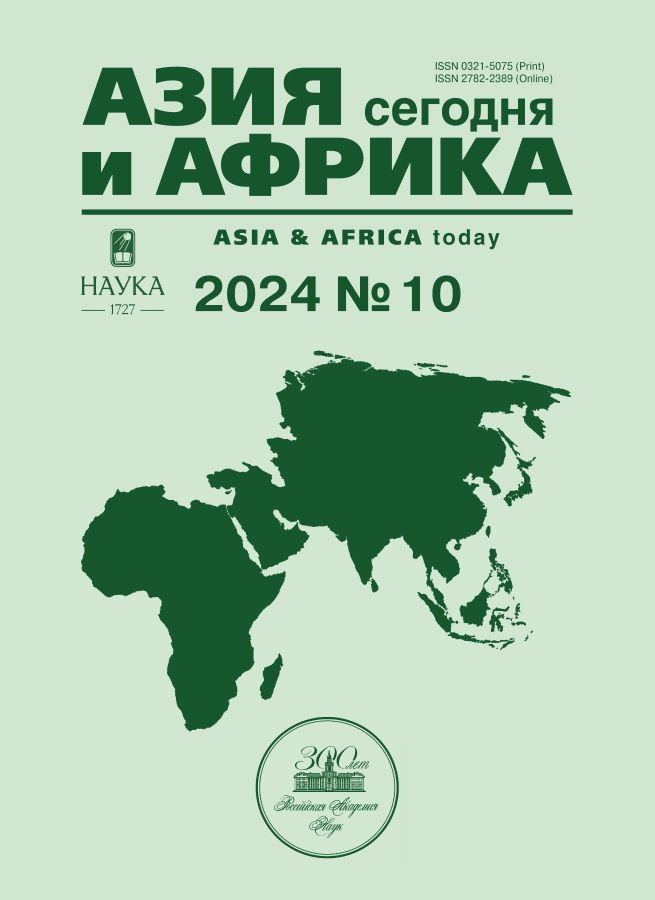The Evolution of the Image of the SCO in India’s Foreign Policy
- Autores: Shchedrov I.Y.1
-
Afiliações:
- IMEMO
- Edição: Nº 10 (2024)
- Páginas: 16-24
- Seção: Politics, economics
- URL: https://kld-journal.fedlab.ru/0321-5075/article/view/647456
- DOI: https://doi.org/10.31857/S0321507524100023
- ID: 647456
Citar
Texto integral
Resumo
India transitioned from observer status in 2005 to full membership in 2017. The decision to convene the 2023 Delhi Summit virtually has sparked substantive discussions. The paper analyzes the transformation of the image of the SCO within the political establishment, the expert community and the general public for the period from 2001 to 2023. Through an analysis of 2,340 publications from the Indian media, the change in narratives was determined. The study discerns the structural (quantitative and qualitative) dynamics that delineate the SCO’s depiction in the socio-political discourse. While political leaders and expert community expressed interest in the organization’s activities at an early stage, public attention has increased only since 2015. The interaction with the SCO is traditionally viewed in the context of bilateral relations with China and Pakistan. The politicians view the organization as a “balancer” in relations with the United States, assessing the SCO as a tool for increasing India’s presence in Eurasia.
Palavras-chave
Sobre autores
Ivan Shchedrov
IMEMO
Email: ivanschedro@gmail.com
ORCID ID: 0000-0002-3477-6320
Junior Researcher, Center of Indian Ocean Region Moscow, Russian Federation
Bibliografia
- Bakshi J. 2002. Shanghai Co-operation Organisation (SCO) before and after September 11. Strategic Analysis. № 26(2). Pp. 265-276.
- Bhadrakumar M.K. India’s discontent with the SCO. Mainstream Weekly. 2023. July 6. http://mainstreamweekly.net/article13589.html (accessed 07.09.2023)
- Katju V. India at risk of becoming SCO outlier. The Tribune. 2023. May 10. https://www.tribuneindia.com/news/comment/india-at-risk-of-becoming-sco-outlier-506357 (accessed 07.09.2023)
- Krishnan A. India backs greater SCO role in Afghanistan. The Hindu. 2012. June 7. https://www.thehindu.com/news/international/india-backs-greater-sco-role-in-afghanistan/article3500209.ece (accessed 07.07.2023)
- Mohan C.R., Khanna P. Getting India Right. Mutual interests and democratic affinity. Hoover Institution. 2006. February 1. https://www.hoover.org/research/getting-india-right (accessed 07.07.2023)
- Pant H.V. Opinion: India’s Struggle Within The SCO. NDTV. 2023. May 6. https://www.ndtv.com/opinion/indias-struggle-within-the-sco-4010887 (accessed 07.09.2023)
- Pant H.V. Opinion: Evolving Trajectory Of The SCO And Indian Dilemmas. NDTV. 2023. July 7. https://ndtv.com/opinion/evolving-trajectory-of-the-sco-and-indian-dilemmas-4186849 (accessed 07.09.2023)
- Roy M.S. The Shanghai Cooperation Organisation: A Critical Evaluation. IDSA. 2006. July 4. https://www.idsa.in/idsastrategiccomments/TheShanghaiCooperationOrganisation_MSRoy_040706 (accessed 07.07.2023)
- Roy M.S. 2012. India’s Options in the Shanghai Cooperation Organisation. Strategic Analysis. № 36 (4). Pp. 645-650.
- Singh S. 2000. India and the Shanghai Forum. Strategic Analysis. № 24 (6). Pp. 1171-1175.
- Stobdan P. 2004. Central Asia and India’s security. Strategic Analysis. № 28 (1). Pp. 54-83.
- Stobdan P. 2008. Shanghai Cooperation Organization: Challenges to China’s Leadership. Strategic Analysis. № 32(4). Pp. 527-547.
- Upadhyay B. India’s SCO Membership: Prospects and Constraints. ICWA. 2016. August 12. https://www.icwa.in/show_content.php?lang=1&level=3&ls_id=603&lid=545 (accessed 07.07.2023)
Arquivos suplementares










